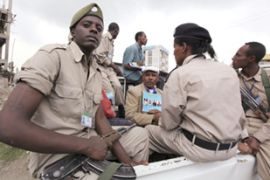Ethiopians set to vote
Meles Zenawi set to be returned as PM in first polls since violence of disputed 2005 vote.

The opposition admits it has little chance of victory but says that is because the EPRDF has tightened its grip on power since the 2005 polls, routinely intimidates and jails its critics and tries to divide the opposition.
2005 riots
In 2005, riots broke out in Addis Ababa when the EPRDF was declared winner. Security forces killed 193 protestors and seven policemen also died in trouble that tarnished the reputation of one of the world’s biggest aid recipients.
The EPRDF says it has since won popularity during a period of sustained economic growth by building roads, hydropower dams and electrifying villages in a country where nearly 10 per cent of the population needed emergency food aid last year.
There were concerns over whether Sunday’s vote would go peacefully, our correspondent said, and what would happen if there were again a dispute over the results, but he added that the political atmosphere was very different from five years ago, with people mindful of what happened in 2005.
While there has been some violence in the two regions of Oromia and Tigray, the capital has been calm before polling.
Outside the capital, both sides say members have died in politically motivated killings.
Diplomats and staff of some foreign charities have been banned from leaving Addis Ababa without permission from the authorities until after the poll.
In Tigray, the ruling party is facing a challenge from former members who fought with Meles over economic policy and how to deal with rival Eritrea.
17 years in power
Meles became leader of Ethiopia in 1991 when a rebel group led by him ousted a communist regime that killed hundreds of thousands of Ethiopians in a 17-year rule.
The 55-year-old leader was lionised by the West in 1991, with the then US president, Bill Clinton, calling him one of a “new generation” of leaders who would bring democracy to the continent.
But Meles has increasingly been criticised by rights groups who say he is becoming more autocratic and stifles dissent in the country of 80 million people.
Birtukan Mideksa, leader of one of the Medrek member parties and seen by analysts as a potential replacement for Meles, is in prison accused of violating the terms of a pardon that released her from a previous jail spell in 2007.
Medrek is running 421 candidates for the 547-seat federal parliament, not as high as the EPRDF’s 521, but enough to form a clear majority should they pull off a shock win.
The next biggest opposition parties, the All Ethiopian Unity Organisation and the Ethiopian Democratic Party are running 350 and 250 candidates respectively.